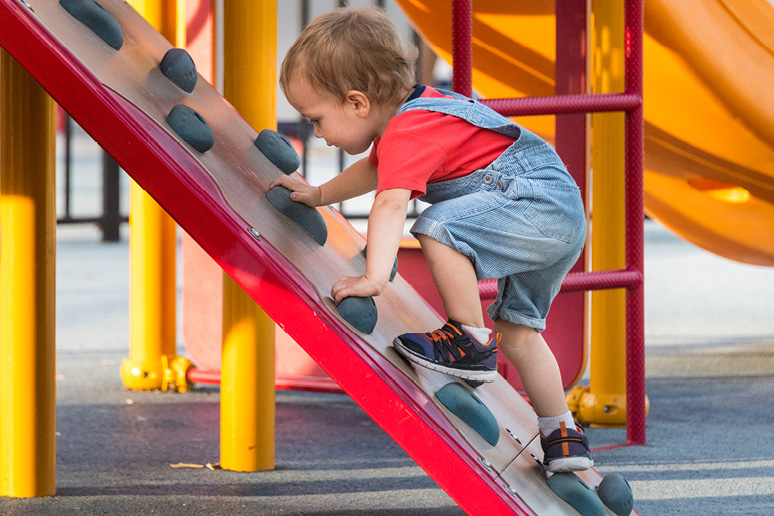Every child is prone to scrapes and bruises after a day at the playground. But if your child falls hard or hits their head, you may be looking at a serious injury.
“Your child may come to you in tears after falling from playground equipment. But what appears to be a simple bump on the head could be a sign of a more serious injury,” writes Bruce Millar, an Atlanta-based personal injury attorney with Millar Law Firm. “Because head injuries can quickly develop into life-or-death situations, it’s important to monitor your child closely after a head injury.”
According to the Centers for Disease Control and Prevention (CDC), more than 200,000 children visit the emergency room with playground injuries each year. Of those injuries, nearly half involve bone fractures, concussions, amputations, or internal injuries. In some cases, injuries are fatal.
To determine liability, you must first determine the cause of the accident. If your infant fell from a high place because you were not providing adequate supervision, for example, you aren’t likely to win a lawsuit claiming another’s negligence. It’s a different story, however, if your child was injured when the slide she was on collapsed.
If your child was injured in a playground accident, take him or her to the hospital and then get in contact with a personal injury or product liability attorney.
Determining Liability
In the event of a playground injury, there are multiple parties who could potentially be liable. These include:
- Equipment manufacturer
What if the equipment was relatively new and properly maintained, but a defective design resulted in harm to your child? If the dangerous defect occurred during the design or manufacturing process, the manufacturer may be liable. In 2010, 9-year-old Alyssa Avila died in Oklahoma after falling from an “X-Wave,” a piece of playground equipment similar to a teeter-totter. Although the equipment was relatively new and had been well-maintained, the child’s parents sued the company that made the X-Wave and its retailer, claiming defective design.
The attorneys at the Oklahoma personal injury firm Atkins & Markoff write, “According to Thom Thompson, a playground equipment consultant, the X-Wave is a dangerous device he wouldn’t recommend to a school. Because it can hold so many children, children are likely to be falling off and trying to get back on while the device is still moving. That makes it more likely the children will be hit in the head or face while trying to get back on the seats.”
The lawsuit against the company that manufactured the X-Wave was settled for an undisclosed sum in 2013.
- Contractor
What if a swing set wasn’t properly assembled and your child was injured when the swing’s chain snapped in mid-air? If the property owner hired a contractor to assemble and install the playground equipment, the contractor may be liable.
- Property owner
What if your child is injured by a piece of rusted metal jutting out of a piece of playground equipment? If the equipment was safely designed, manufactured, and installed but the property owner failed to provide proper maintenance over the years, the property owner may be liable.
- Public and private parks
When it comes to suing for injuries, public parks are another animal entirely. If your child was harmed on playground equipment located in a public park, your first instinct may be to sue the municipality or city. Unfortunately, suing a government entity is a highly complex process and should not be attempted without skilled legal counsel. Government agencies actually have immunity from a variety of lawsuits. That doesn’t mean you can’t sue them for injuries. To get around this immunity, however, it’s important to follow certain protocol, such as first filing a claim with the city.
- Caregiver
In general, you can only sue a caregiver for negligence if he/she agreed to supervise your child(ren), and his/her inattentiveness was a direct cause of injury. In layman’s terms, suing a teacher or caregiver can be quite difficult, especially when an older child is injured. But that doesn’t mean that it’s impossible.
Understanding premises liability theory
The theory of Premises Liability holds property owners (and, in some cases, tenants) liable for injuries that occur on their property. Therefore, if your child is injured while playing on poorly maintained playground equipment at someone’s home, the home owner may be liable. If the home is a rental, liability may land on the landlord (property owner) or the tenant, depending on who is responsible for the equipment.
In a 2018 lawsuit, a teenager with permanent brain damage from a faulty swing set was awarded $20 million under premises liability. The defendants named included the manufacturer of the swing set, the company that installed the set, and the homeowners association responsible for the playground. The attorneys at Sakkas, Cahn & Weiss, LLP noted that the case “was one of the largest premises liability awards ever in Nevada.”
Your child was injured. Now what?
Due to the potential for multiple parties, cases involving playground injuries can be complex. Further, the property owner is often a government entity (such as a community park) or school district. There are special requirements for filing a personal injury claim against government entities—like a public park—and doing so without legal help can be overwhelming. Don’t make the mistake of trying to go it alone. In any situation, the assistance of an experienced personal injury attorney can greatly improve your chances of success.
 By Amy Carst,
By Amy Carst, 

